I always thought that The Last of Us was an overrated video game. It was good, sure, don't get me wrong. But I never thought that it was the "pinnacle of story-telling in gaming", as many of its biggest fans suggested. To me, it was a good zombie story about the risk of closing ourselves off from each other, which was stapled to a good cover-based shooter. But, to me, the whole always felt like less than the sum of its parts. The gameplay of The Last Of Us was always more about setting a tone than about telling the story. And if your gameplay isn't helping to tell the story, then, as far as I'm concerned, you're not a particularly good example of the interactive video game medium.
So when HBO announced that it would be producing a TV mini-series adapting The Last Of Us, my initial reaction was "why bother?". Like with so many modern remakes, reboots, and adaptations of barely 10-year-old media, I felt like the original is fine, and if you want to watch a Last Of Us movie, you could just hop on YouTube and watch a compilation of all the cutscenes. Honestly, you wouldn't be missing much by ignoring any of the actual game -- let alone by not playing it yourself.
Very little of The Last Of Us' gameplay informed the story in any meaningful way.
Well, HBO's streaming series manages to simultaneously vindicate that feeling, while also showcasing that The Last Of Us does actually benefit from being adapted into the medium that it was always better suited for anyway. The creators of the video game, themselves, in adapting the game, basically cut out all of the actual video game. Virtually nothing that the player ever has to do in The Last of Us was translated to the TV show. It's as if all the actual video game was never really important at all to telling the story. The TV show basically adapts all the cutscenes, telling the same basic story -- sometimes better than the game did -- and without all the meddlesome video game getting in the way.
In the entire 10-episode mini-series, there is [I think] two scenes of our characters having to sneak past infected -- one of which is a flashback. And not a single one of the multitude of scenes in which Joel and Ellie are ambushed by random raiders is adapted at all. Seriously, the characters keep talking about how dangerous it is outside of the quarantined cities because of raiders, but yet we never once see any actual raiders. The closest we come is the ambush by the revolutionaries in Kansas City. Then there are a couple scenes of Joel and Ellie getting ladders or unlocking doors for each other, which was about the only part of the game that ever contributed to the story-telling by reinforcing the relationship and growing inter-dependence of the characters.
Under most circumstances, I would say that adapting a game by cutting out so much of the game would be a "bad thing". In this case, however, it isn't. It might actually be an improvement. I always felt like the bulk of the gameplay in The Last Of Us was just filler anyway. All the actual story -- all the stuff that everybody remembers and loves -- happens outside of the player's control.
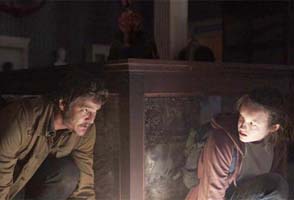 The Last Of Us Episode 2, © HBO, Sony Television.
The Last Of Us Episode 2, © HBO, Sony Television.
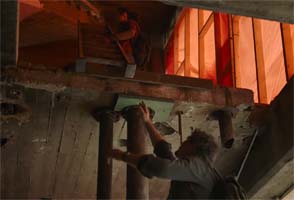 The Last Of Us Episode 9, © HBO, Sony Television.
The Last Of Us Episode 9, © HBO, Sony Television.
Very little of The Last Of Us' gameplay was adapted into the TV show.
The growing fungal threat
The TV mini-series doesn't only cut gameplay content out; it also adds quite a bit new story, and changes things here and there. There are a lot of flashbacks to the days before the outbreak, and to the early days of the outbreak. These serve to provide additional characterization for Sarah, in order to make her a more fully-fleshed out character. It also provides backstory regarding the origin of the mutated cordyceps, and why Ellie is immune.
When The Last of Us released back in 2013, the idea of a cordyceps apocalypse was kind of laughable. Fungi can infect insects, but they cannot survive in the warmer bodies of mammals. The worst that humans have to worry about is topical infections like athlete's foot or yeast infections.
However, as the show points out in its opening minutes, there is actual growing concern from infectious disease experts that climate change could actually cause fungi to become a serious infectious hazard to humans. The reason for this is that the rising temperatures of the Earth (due to human-induced climate change) is causing many fungal species to adapt to warmer temperatures. Even just adding a couple extra degrees of temperature tolerance would be enough for certain fungi to survive in the warm-blooded bodies of mammals and cause serious illness. Cordyceps would need a lot more mutation than just a couple extra degrees of temperature tolerance in order for it to become a threat to humans, but other fungi (such as the yeast Candida Auris) have already begun causing serious illness to humans.
Worse yet, there are no known vaccines or cures for fungal infections. Part of this is because there hasn't been a need to develop them, but it's also because the biology of fungi makes it very difficult to develop drugs that can target fungal infections without also targeting and killing healthy human cells or organs. Now, in 2022 and 2023, the idea of a fungal pandemic isn't quite as laughable, and is, in fact, a lot more serious and frightening, compared to a decade ago. Touché Naughty Dog...
Oddly though, the TV series did eliminate one of the 2 key vectors of infection that was presented in the games: inhaling the fungal spores. Apparently, the risk of being infected by the spores just isn't a thing anymore, even though, realistically, that would likely be the primary cause of infection in a real-life fungal pandemic. Humans inhale shit-tons of fungal spores every day. But since they typically do not [currently] survive in our warm-blooded bodies, they pose no threat to people with healthy immune systems.
Spores are no longer an issue in the TV adaptation.
I guess maybe the show's writers didn't want to force the actors to have to keep wearing gas masks, or to justify how the characters know that microscopic spores are present before they've already inhaled them and are infected. Pedro Pascal already supposedly complained about having to wear a helmet all the time in The Mandalorian, so I guess trying to get him to wear a gas mask for the entirety of The Last Of Us would have been a much harder sell.
Unfortunately, this has the effect of making the zombie stuff in The Last Of Us feel more like typical zombie media. The spores were one of the few elements of the game that separated this particular take on zombies from all the other common depictions of zombies.
Who is "us"?
In another incredible subversion of expectations, the best episodes of the TV series are the ones that stay the closest to the source material, and also that one that deviates the most from the source by completely throwing out and re-writing a side-character's entire story arc.
The original game was divided into a series of vignettes, each of which serves as a peek into Joel's potential future, and each of which redefines the borders of the "us" referenced in the title. Does "us" mean "every one for themselves"? Does it mean "me and my immediate family and friends"? "A broader community or tribe"? "Anyone who asks for help"? Or does it mean "all of humanity"? The mini-series maintains this basic structure, and tells basically the same story with it. But it does make one massive change!
In the original, Bill's story is a cautionary tale. Bill is an example of the miserable misanthrope that Joel could become if Joel either refuses to let Ellie into his life, or if he does, but fails to protect her. Bill's story in the game is sad. His thesis is that attachments to other people are a liability.
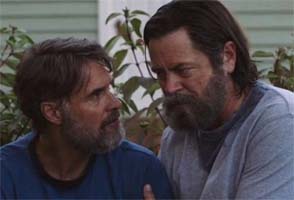 The Last Of Us Episode 3, © HBO, Sony Television.
The Last Of Us Episode 3, © HBO, Sony Television.
The best episode of the show is the one that deviates the most from the game.
In the show, however, this character's story is turned on its head. It still has a tragic ending, but it's a happy kind of tragic. It presents an optimistic story about how we find meaning in our relationships with other people. Other people aren't a liability; they are a source of strength and hope. And even if that relationship ends prematurely, the time that you had together makes it worthwhile. That relationship will bring you more good days than bad days.
This change alters the tone of everything that follows because now we start with that positive, aspirational example of what life in the apocalypse can be. The whole story feels less nihilistic because now we have that early example of characters having a fulfilling life together, that they live (and end) on their own terms.
On the other end of the spectrum, the episode about David and his flock replicates the game about as close to verbatim as is possible. This is the other best episode in the series.
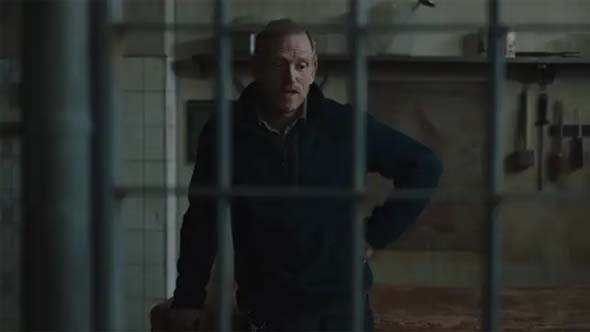 The Last Of Us Episode 8, © HBO, Sony Television.
The Last Of Us Episode 8, © HBO, Sony Television.
Other episodes follow the game almost verbatim, and are also the best episodes of the series.
The Last Of Us changed to match the changing times
Despite whole episodes being entirely about backstory, and explaining things that were never explained in the game, other bits of back-story ended up being cut almost entirely. One of my favorite bits from the game was the underground bunker storyline during Sam and Henry's chapter. It involved a small community of children and caretakers, and ended with one caretaker barricading himself in a room with a bunch of young children, and deciding to euthanize them all instead of being eaten or turned by a horde of infected.
This bunker is present in the show, but none of its story is told or shown to the audience at all. The bunker is just empty, as if everyone simply left. No bodies. No lingering infected. No journal outlining the tragic fate of the children. Just a bunch of drawing that indicate that children did live there, but without providing any context for what happened to them.
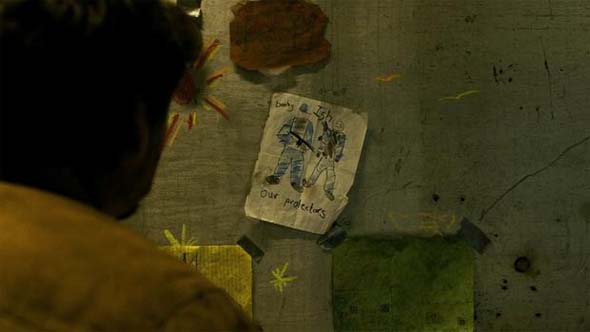 The Last Of Us Episode 5, © HBO, Sony Television.
The Last Of Us Episode 5, © HBO, Sony Television.
One of my favorite bits of backstory from the game was basically cut from the TV adaptation.
I have other minor quibbles. Like my dislike for a storyline involving a group of freedom fighters ousting the fascistic FEDRA government, only to turn around and act just as fascistic as FEDRA. This is one of the few instances in which I think the show is absolutely sending the wrong message at the wrong time. Depicting anti-fascist activists as just being closet-fascists is not a good message to be giving in our current political climate in which actual fascist (and outright NAZI) right-wing movements are growing within the United States and Europe and gaining a frightening amount of political power and impunity against the normal democratic checks and balances. Very bad take, HBO.
But that doesn't take away from the fact that The Last Of Us is a remarkable adaptation of its source material. It stays faithful in all the ways that are important, while also being brave enough to make changes that better suit the new medium, or to adapt to the changing times. It's a more optimistic and less nihilistic interpretation of the original story. Or at least, it is up until the last couple episodes, at which point it reverts back to the game's gut-punch of an ending.
The casting and performances are also top notch. Pedro Pascal and Bella Ramsey absolutely nail the roles. If future remasters or remakes of the game redesign Ellie to look and sound more like Bella Ramsey (and less like an un-licensed knock off of Ellen Page), then I would not complain. Side characters like Tess, Bill, and Sam are also excellently depicted by their respective performers.
The production value is also high. The writing is solid. In fact, the writing is probably better than the writing in the game. Almost like the game is a "rough draft" of the script, and this is the final draft. Also the cinematography and visual effects all look good, and the music and overall sound design is great.
Zombie stories have always been a reflection of the fears and anxieties of the time in which they are made. Both versions of The Last Of Us are about the fear of society unraveling because of our increasing polarization and inability to empathize with each other. But where the original game took a more nihilistic approach, this TV adaptation wants to show a more hopeful and optimistic post-apocalypse. Instead of focusing as much on the ways that we hurt ourselves and each other, HBO's The Last Of Us puts greater emphasis on showing us the value of coming together.